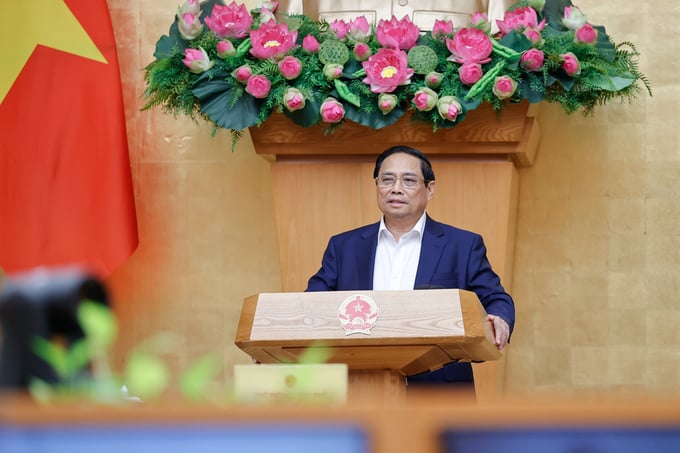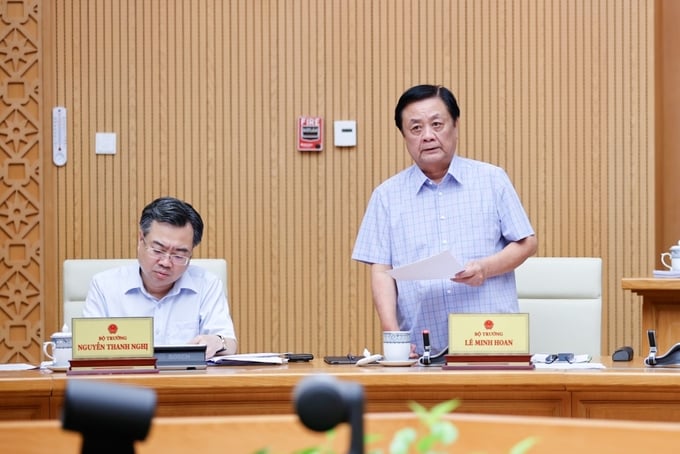June 14, 2025 | 22:38 GMT +7
June 14, 2025 | 22:38 GMT +7
Hotline: 0913.378.918
June 14, 2025 | 22:38 GMT +7
Hotline: 0913.378.918

The Prime Minister chairs a regular Government meeting on August 5. Photo: VGP.
Prime Minister Pham Minh Chinh convened the regular Government meeting for July 2024 on the morning of August 5, and the discussion agenda encompassed a variety of significant topics.
The Prime Minister stated that the socio-economic situation in July continued to exhibit positive trends, achieving better results than in June. In general, the seven-month period demonstrated improvements in most sectors compared to last year. All three sectors—agriculture, industry, and services—experienced growth. There was a surplus, significant balances guaranteed, inflation controlled, and macroeconomic stability maintained.
The objective of maintaining macroeconomic stability, controlling inflation, concurrently promoting stronger growth, and ensuring major balances and higher surpluses will be underscored by Prime Minister Pham Minh Chinh in the future. The overarching management perspective is that each month should surpass the results of the previous month, each quarter should surpass the previous quarter's results, and the accomplishments of 2024 should be more extensive, inclusive, and comprehensive than those of 2023. The Prime Minister specifically requested that the primary balances of the economy be ensured while macroeconomic stability, inflation, and growth are maintained as a priority.
Monetary policy should be proactive, flexible, timely, and effective, and it should be maintained in close and harmonious coordination with a reasonable, expansive fiscal policy that has focused and prioritized objectives, as well as other macroeconomic policies.
Regarding monetary policy, the Prime Minister requested that the State Bank concentrate on stabilizing the exchange rate and the foreign exchange market, increasing access to credit by concentrating on priority sectors and striving for an annual credit growth of approximately 15%, and continuing to reduce lending rates.
The Ministry of Finance should endeavor to increase revenue, reduce expenditures, implement digital transformation, and implement electronic invoices in tax administration to adhere to fiscal policy. Additionally, it should rigorously reduce regular expenditures and efficiently execute policies that pertain to the exemption, reduction, and deferral of taxes, fees, and charges.

Minister of Agriculture and Rural Development Le Minh Hoan speaks at the meeting. Photo: VGP.
Implement comprehensive solutions to manage inflation following the established guidelines. The Ministries of Finance, Industry and Trade, Agriculture and Rural Development, Education and Training, Health, and related agencies should prioritize preserving market stability and the prices of essential commodities.
Assess the impact, prepare exhaustively, and establish a suitable roadmap for adjusting the prices of state-managed services (education, healthcare). Ensure there are no shortages and an adequate supply of electricity and fuel to satisfy the demands of production and consumption in all circumstances.
Furthermore, the Prime Minister directed the Ministries of Finance, Planning, and Investment to proactively develop the National Economic-Social Development Plan, the 5-Year National Financial Plan, and the Medium-Term Public Investment Plan for the 2026- 2030 period.
In particular, it is imperative to prevent the dispersion of resources; central budget investments should prioritize critical national projects, as well as key projects that facilitate inter-regional and international connectivity.
The Prime Minister's subsequent assignment is to prioritize vigorously promoting new growth drivers and renewing traditional growth drivers.
The Ministry of Planning and Investment will be responsible for the following in the area of investment: promoting private investment, strengthening public-private partnerships, and selectively attracting FDI. Additionally, it will proactively accelerate the implementation of public investment projects and three national target programs.
Concerning exports, consolidate major traditional markets; expand new markets (UAE, Halal, Latin America); assist enterprises in preparing conditions, meeting new standards, green standards, promoting, and marketing; access potential markets and investigate anti-dumping for Vietnamese goods, among other things.
In terms of consumption, the market should be vigorously developed to stimulate domestic consumption. The campaign "Vietnamese people prioritize using Vietnamese goods," e-commerce and cashless payments (linked with electronic invoices and tax collection) should be implemented.
Establish efficient mechanisms and policies to vigorously encourage the adoption of new growth drivers, including institutional, policy, regional economic development, regional linkage, urbanization, digital transformation, green transformation, circular economy, sharing economy, knowledge economy, high-value sectors, and technologies such as semiconductors and AI.
Therefore, the Ministry of Planning and Investment will lead the review and propose innovative mechanisms and policies in these areas. This will include the development and refinement of the legal framework for green economic development, including the green credit market, circular economy development, and green transformation. Additionally, the Ministry will research policy packages of sufficient scale, suitability, and feasibility to assist enterprises and promote new growth drivers, such as semiconductors and AI. The Ministry of Finance will expedite the Carbon Market Development Scheme in Vietnam.
Ensuring social welfare
The Prime Minister also underscored the importance of the Ministries of Agriculture and Rural Development (MARD), Natural Resources and Environment (MONRE), and local authorities to closely monitor the developments of natural disasters and storms, respond promptly and effectively, and minimize damage to the lowest level. This will ensure that no one is left homeless, hungry, or cold. Effectively execute support work to assist individuals in overcoming the repercussions of natural disasters; guarantee the timely distribution of rice to ensure that no one leaves hungry.
The National Fund should be vigorously supported, and the movement should be forcefully promoted by ministries, sectors, and localities to eliminate temporary and dilapidated housing for impoverished and near-poverty households. The Ministry of Health should concentrate on operationalizing projects and resolving issues at Viet Duc Hospital and Bach Mai Hospital, Phase 2.
The Ministry of Education and Training should ensure that the new school year is well-prepared, that textbook prices are not increased at this time, that school hygiene and safety are maintained, and that children are not drowned.
The Ministry of Labor, Invalids, and Social Affairs should enhance its monitoring of the situation and proactively implement solutions to balance labor supply and demand, particularly in industrial zones.
Translated by Linh Linh

(VAN) The working delegation from the Ministry of Agriculture and Environment conducted an important trip to the Netherlands to strengthen strategic partnerships and sustainable development in the agricultural sector.

(VAN) The letter ‘A Plea from the Ocean’ not only evokes emotion but also awakens the human conscience to the responsibility of protecting life on Earth.

(VAN) The Department of Agriculture in South Africa has announced the country’s first mass vaccination of poultry to prevent local birds from contracting avian influenza.

(VAN) Establishment of the Mekong Delta Regional Agricultural Linkage Center, aiming for a closed value chain, deep processing, trading platforms, and international market connectivity.

(VAN) Gia Lai province has recently recorded 460 rare species of animals and plants, contributing to forest conservation and biodiversity planning in the region.

(VAN) Ms. Caroline Beresford, New Zealand Ambassador to Vietnam, expressed confidence that agricultural cooperation between Vietnam and New Zealand will develop sustainably, be climate-resilient, and promote gender equality.

(VAN) Vietnam reaffirms its commitment to international cooperation in fostering sustainable and responsible fisheries while ensuring resilient livelihoods for small-scale fishing communities.